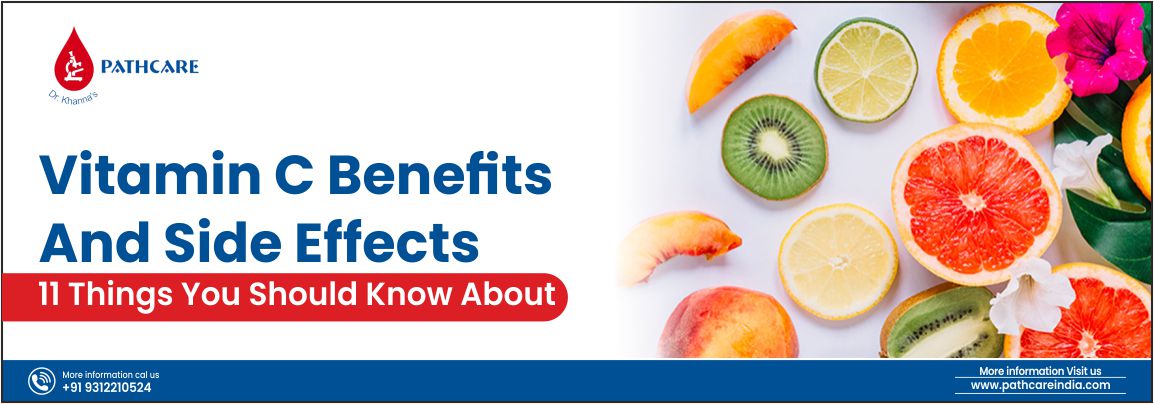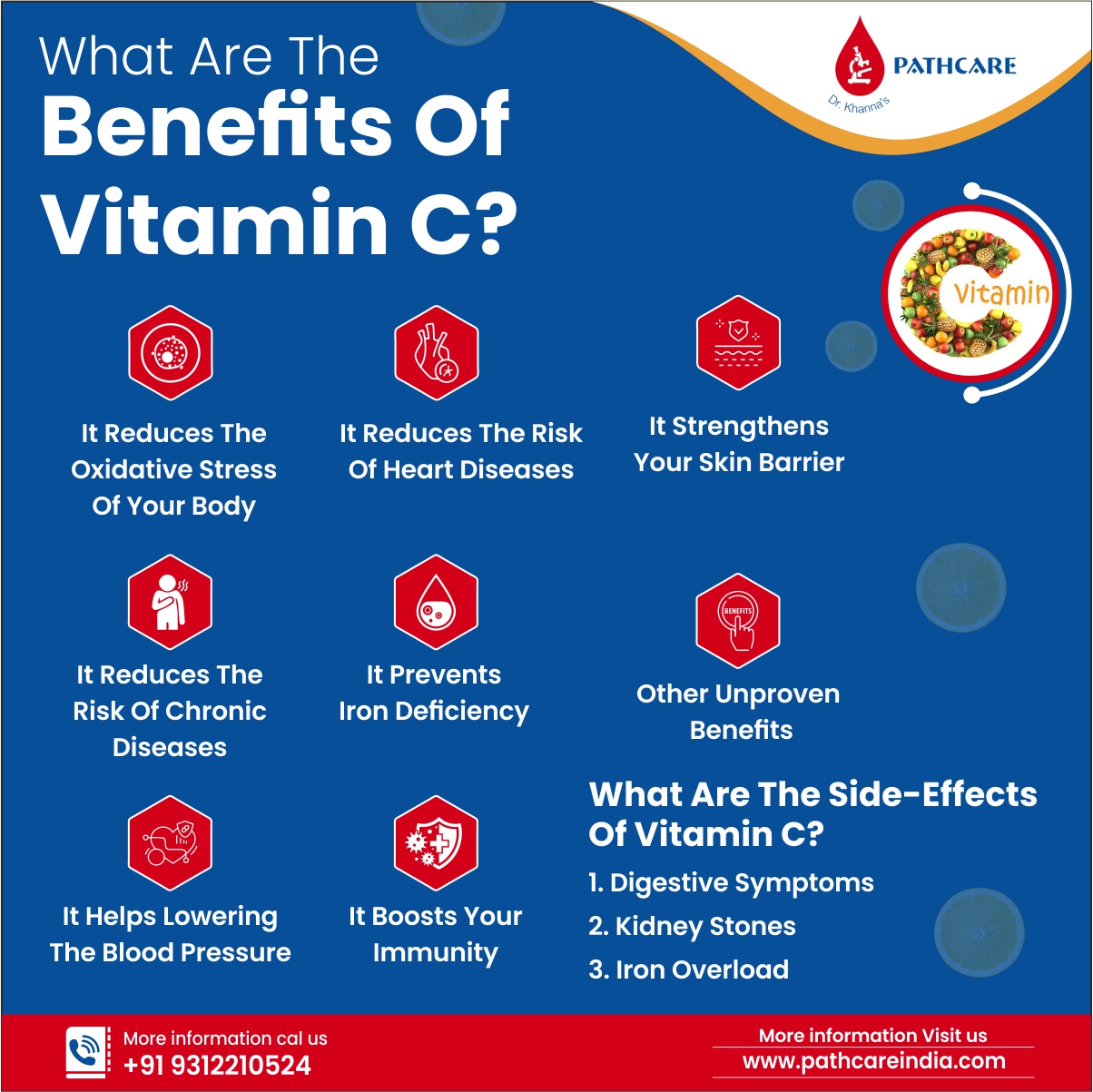No products in the cart.

You must have always heard about the numerous benefits of vitamin C, but did you know there also could be some downsides to this compound? Vitamin C, or ascorbic acid, is one of the most commonly known nutrients. It is a regular part of our diet and benefits our body in more than one way. While it is necessary to include this compound regularly in your diet, you can also consume it too much to the point that it can harm your body. So you must know about the appropriate dose and the right way of including this vitamin in your diet. Understanding the benefits and side effects of vitamin C can also be helpful.
The article below describes the several benefits of vitamin c and how and under what conditions it can affect you adversely.
What Are The Benefits Of Vitamin C?
Vitamin C works on your body inside out. It assists in efficiently functioning your metabolic and organ systems and eliminates obstructions. The results of this function might not be apparent, but your body benefits from it in the long run. Also, this vitamin works on the surface level in healing and rejuvenating your skin to give obvious results. It plays a part in several of your important body processes.
Some of the major vitamin C benefits are mentioned below.
#1. It Reduces The Oxidative Stress Of Your Body
Vitamin C is a highly potent antioxidant. It is among the most important and beneficial characteristics of this compound. Due to the imbalance of essential nutrients and inefficient metabolism, free radicals get deposited in your body. High levels of free radicals lead to unnecessary oxidation and reduction reactions in your body. This increases oxidative stress, which is associated with neurological disorders as it damages the nerve cells. Another consequence of oxidative stress is senescence. It is the accumulation of zombie cells or senescent cells that have lost their ability to divide but are still alive.
Ascorbic acid neutralizes these free radicals, reducing the oxidative stress in your body. This consequently prevents the damage of nerve cells and senescence.
#2. It Reduces The Risk Of Chronic Diseases
Vitamin C is known to increase the antioxidant levels in your blood by 30%. This increases your body’s ability to fight against inflammation and other possible infections. It reduces the risk of chronic diseases like Alzheimer’s disease, asthma, and cystic fibrosis.
#3. It Helps Lowering The Blood Pressure
High blood pressure is associated with the contraction of blood vessels. This gives the blood less area to flow and thus increases its flow rate. Vitamin c relaxes the blood vessels, widening their diameter and lowering blood pressure.
A study showed that in a healthy individual, regular intake of vitamin C could lower the systolic or upper blood pressure by 3.8 mmHg and the diastolic or lower blood pressure by 1.5 mmHg.
#4. It Reduces The Risk Of Heart Diseases
Hypertension, high levels of bad cholesterol or LDL (low-density lipoproteins), and low levels of good cholesterol or HDL (high-density lipoproteins) are the major causes of heart diseases. Ascorbic acid helps regulate your blood’s cholesterol levels and lowers blood pressure, thus reducing the risk of heart diseases.
#5. It Prevents Iron Deficiency
Vitamin C helps your body in more efficient iron absorption. Iron is a significant component of hemoglobin and myoglobin. The former supplies oxygen to all the cells and tissues, while the latter is responsible for transporting oxygen to the muscles. Low vitamin C intake can lead to low levels of iron in your body.
#6. It Boosts Your Immunity
Vitamin C increases the production of white blood cells in your body. These cells form a major part of your immune system. This boosts your skin’s ability to fight against infections and promotes faster wound healing.
#7. It Strengthens Your Skin Barrier
Healthy skin contains vitamin C in ample amounts. You can think of it as a binding thread that holds the collagen molecules in your skin together. It also boosts the natural production of collagen in your skin cells. This helps in reducing fine lines, wrinkles, and acne scars. Ascorbic acid also prevents the formation of abnormal pigments in your skin cells and destroys such pigments that are already present. This is why vitamin C deficiency in your skin makes you more prone to skin damage from the sun’s ultraviolet rays.
#8. Other Unproven Benefits
It is said that vitamin C can cure a common cold, reduce uric acid levels in your blood, prevent lead toxicity, and lower the risk of cancer and eye diseases. While these effects have been observed in some individuals, they have not been scientifically proven. However, there is a high chance that vitamin C plays a minor or major role in the functions mentioned above.
What Are The Side-Effects Of Vitamin C?
The side effects of vitamin C are very rare and conditional. They are caused by excess intake of this vitamin. While it is not possible to overdose on vitamin C simply through diet, vitamin C supplements pose a risk in this case. Keep a check on the dosage of the supplements if you are taking them. Also, if you are suffering from any health condition, always consult with your doctor before you start taking the supplements.
Incorporate vitamin C into your diet through natural sources like oranges, lemon, amla, and other citrus fruits. They have other benefits, too, and do not pose any risk of side effects.
The possible side effects of vitamin C include
#1. Digestive Symptoms
Usually, a high intake of vitamin C can lead to digestive symptoms. It has been observed that the intake of more than 2000 mg of vitamin C at once can cause symptoms like acid reflux, diarrhea, and nausea.
Again, it is highly unlikely to get that amount of vitamin C through a natural diet. Supplements pose a high risk here.
#2. Kidney Stones
Vitamin C is water-soluble. It is regularly purified by the kidneys and flushed out of the body. High levels of this vitamin can cause it to react with other minerals to form crystals. These crystals can get accumulated in the kidneys during purification and, over time, lead to the formation of kidney stones.
#3. Iron Overload
Non-heme-iron is a form of iron derived from plant sources. The human body has poor absorption capacity for this mineral, but high levels of vitamin C can bind to this compound. However, this happens only in individuals suffering from conditions like hemochromatosis. High iron accumulation in the body can cause damage to the heart, liver, pancreas, and central nervous system.
The Bottom Line
Vitamin C is undoubtedly a highly beneficial and essential component of your diet. While supplements are an excellent way to maintain the necessary regular intake of this vitamin, you need to monitor the dosage. The upper vitamin C dosage limit in healthy men is 90mg, while that in healthy women is 75mg. Knowing the required dose and the best intake methods can help you avoid any side effects and enjoy the benefits of vitamin C.





